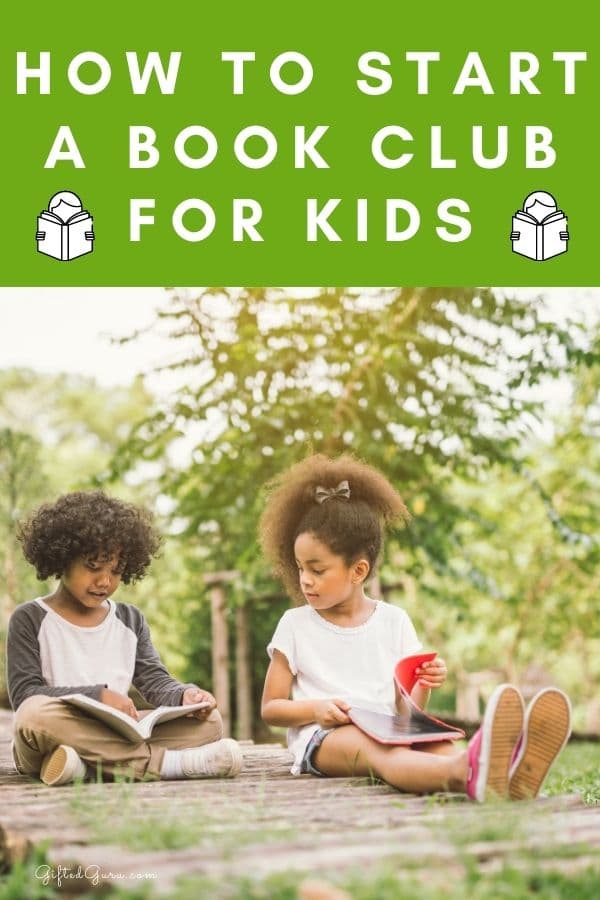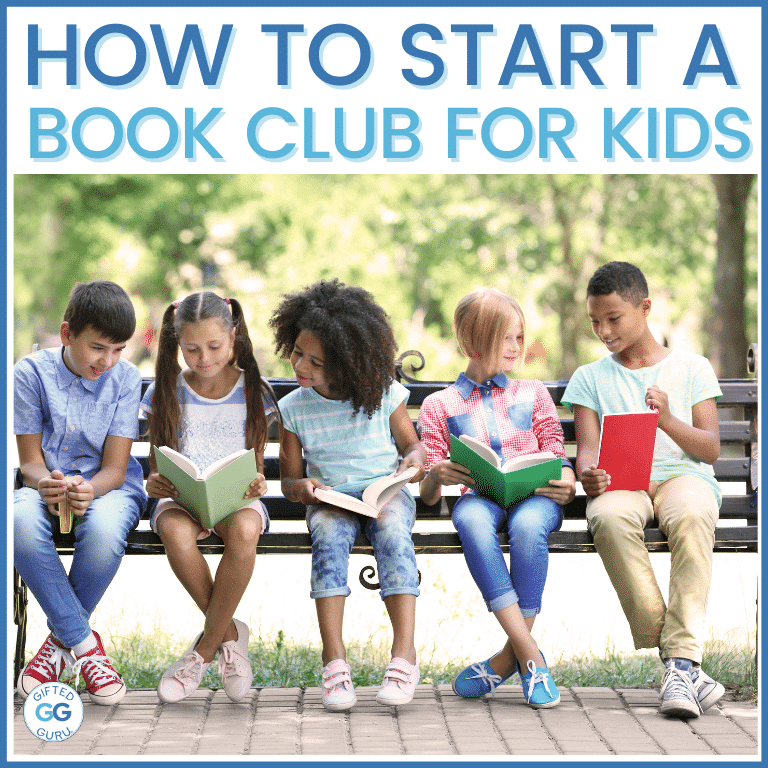Book clubs aren’t just for adults!
To start one:
- decide what the club will be about
- invite the right people and the right number of people
- figure out how people will get the books
- set a meeting schedule
- decide what the flow/agenda of the meetings will be
It’s not difficult! Let’s look at why it’s a good idea.
Why we need to start book clubs for kids
We lose avid readers at two key crossroads: reading acquisition and teenager-hood.
Why then?
We lose avid young listeners as they begin to read because they are often frustrated with the simple plots, controlled vocabulary, and flat characters of the books they can read to themselves – pale shadows of what has previously been read to them.
Many parents decrease reading aloud to their children as the child’s own skill develops, and this can exacerbate the problem.
Teens have two things going against avid reading: time pressure and peer pressure.
There are more demands on their time for required reading, leaving precious little available for leisure reading, and if they do have time, they are often pressured against it by peers who are not readers.
The American Library Association says that teens need three things to be successful (and avid) readers:
- Time
- Choice
- Support.
The creation of a book club can promote all of these key ingredients.
How to begin book clubs for kids
Let’s say you’re convinced. Let’s say you’re interested.
Let me share some tips on how to start and run book clubs for kids of all ages, as well as fabulous resources to help you on your way.
Do you need a book club, or has that wheel already been invented?
Local libraries or bookstores may already have children’s or teen book clubs in place. They may not be perfect for your group, but it may be worth checking out a time or two to get the feel for how a book group with kids runs.
How do you start a book club?
You start a book club the same way you start any group – you invite people. This is the key, most important thing about the book club because the club’s success (or failure) will be due, in large part, to the group dynamic.
You probably need at least six people in the club to allow for the unavoidable misses in attendance. If the book club only has four people, and two don’t show up, well, that won’t feel very club-ish.
Any more than ten or so makes it hard to ensure that everyone gets a chance to talk.
Before you start inviting people, think about what you would really like to do. There are endless possibilities for the make up and theme of the club.
How about a parent-child book club in which parents and children read the same book (mother/daughter; father/son; mixed)?
Consider having a book club for very young readers. A book club can bridge this gap by providing discussion about books that can be read aloud beforehand OR bringing out deeper ideas in picture books or short chapter books the child is reading alone. You can read three books grouped by theme, holiday, or author/illustrator (see Resources at the bottom of this guide).
Does your group need separate clubs? If so, will they run at the same time? For instance, if you have families in your group who have children of vastly different ages or reading levels, you may need more than one club to retain interest. Perhaps you want to start with just one club for a certain demographic and build from there. How about a club just for tween and young teen boys?
Write a list of who you would like to invite, then call them (or email, etc.) to get an idea of when would be a good time to meet. There is very little likelihood of finding a time that will work for everyone, so just pick the best time you can and go with it.
Once you’ve got a time and a list of people, notify people of the first meeting. You may or may not wish to assign a book to be read before this meeting.
One of the things you will have to decide is how people will get the book. Are there sufficient copies of it at the library of the books you are likely to read? Do you expect people to buy them? You, as the leader, may decide, or you may ask people’s opinions about this when you are asking about times to meet.
How to ensure the book club gets off to a good start
Make sure the location works. The local library may provide space for you if no one has a home that is appropriate.
Name the group. You may choose a name or allow the group to choose a name the first time it meets. You will want to have people submit ideas for names ahead of time so that your entire first meeting is not taken up with a heated debate on the name!
Have a secretary who is assigned to keep track of your reading choices, your meeting times/dates, and any other housekeeping items that keep clubs running smooth.
Consider creating a blog, Facebook page, or Twitter account to keep people informed. Increasingly technology is used by youth to communicate with each other. This would be especially appropriate if your book club is for teens.
It’s the first book club meeting. What do I do?
Everyone needs a chance to talk. This is key.
Provide snacks. This can be a shared responsibility in the future, but for the first meeting, have some simple munchies on hand.
You will need a leader to keep the discussion moving and focused on the book. The first couple of times, it may be helpful to have an adult leader, but eventually a child can lead (or children can rotate).
Do you just read books and talk about them?
Worried about crickets chirping at your book club meeting? Have good questions ready. Be prepared for a little silence. It’s okay.
Consider inviting a guest – a librarian or author. Ask local bookstores if they know of local authors. Librarians can do an informative “booktalk” in which they bring a selection of possible books and give brief reviews of them – the group can then pick one to read (or read them all!)
Your groups could eventually have a service component. If you purchase the books, you could donate gently used books to the library or a shelter. Teens could read to young children at shelters or in after school programs at nearby elementary schools.
Write reviews for the books on Amazon, Goodreads, or other sites that post reviews. Your local newspaper may even be interested in a monthly book review for kids by kids.
Want more resources? I’ve got you covered.
I was a guest on the Book Clubbin podcast talking about book clubs for kids. You can listen here.
The Multnomah County Library website provides excellent suggestions for reading divided by age and interest.
Kidsbookclubbook is the companion site to the book The Kids’ Book Club Book: reading ideas, recipes, activities, and smart tips for organizing terrific kids’ book clubs. The book is terrific, and the website has a newsletter with book ideas, giveaways, and suggestions for authors in your area who may be willing to come visit your book club. The site has suggestions for activities, recipes, and, of course, books!
The Story Stretchers series of books provide wonderful activities for extending children’s books with activities. Visit the author’s Amazon author page to see them all.
LitLovers is an excellent site with ideas for book clubs for all ages, including the nuts and bolts of running them and suggestions for discussion questions. For older readers, the site offers thirty minute “courses” on reading well that are free and quite good. (note: this site is down now, so accesses it through the internet archive – search litlovers.com/litkids.htm).
Esmé Codell, author of several children’s books (as well as the parent guide How to Get Your Child to Love Reading) is the host of this incredible site. For parents or kids or book clubs, this is one of the best sites available for children’s books. I met her in person at the National Book Festival once, and I about passed out from excitement.
Bookbundlz has links for children and teen books. One benefit: you can manage your book club from this site. The teen-friendly graphics are particularly appealing.
Though not visually appealing, Carol Hurst’s site is comprehensive, with book reviews of children’s books and how to use them.
Guyslitwire is a blog focused on teen boys’ reading preferences. While I’m a big believer in getting boys to read books about girls (as I wrote about here), I think it’s important to recognize the value of interest as well.
Readergirlz is the highly rated and highly interactive site specifically aimed at girls and their reading. Truly excellent resource.
Oprah’s site has a kids section, as does the American Library Association.
The Library of Congress has a special section just for families, and it is amazing (of course). Explore the Young Readers Center and other offerings.
Read, Write, Think offers general book club helps.
Ever started a book club for kids? Have ideas? Let’s hear them!

Two notes: This article is one I initially wrote when I was the Youth & Education Ambassador for Mensa. I was writing a post and tried to find the article on their site, and it’s gone. This is adapted from that article, and it’s part of my deal with them that I can use the stuff I wrote. Second note: post may contain affiliate links which won’t change your price but will share some commission.




